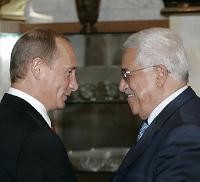In her WPR column analyzing potential brokers of a ceasefire in the Gaza Strip, Frida Ghitis did not consider a possible role for Russia -- and with good reason. While Moscow has sought to position itself as a Middle East kingmaker for decades, its diplomatic initiatives have been noteworthy as much for their minimal results as for their persistence. At present, there is no reason to believe that Russia will have anything more than a negligible influence on the current Gaza crisis. In some respects, this is unfortunate, since it would be extremely helpful if Moscow were able to compel Hamas to yield to international demands to renounce violence and accept Israel's right to exist. On Dec. 21, after Hamas declined to renew its ceasefire with Israel but before the commencement of the Israeli air offensive in Gaza, Palestinian President Mahmoud Abbas met with Russian President Dmitry Medvedev in Moscow. A Kremlin statement said they would "look particularly at the situation in the Middle East to ensure the negotiation process continues and to avoid an Israeli-Palestinian and an inter-Palestinian confrontation."
Global Insights: Moscow as Middle East Peacemaker?

